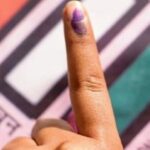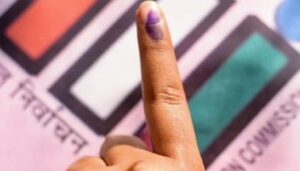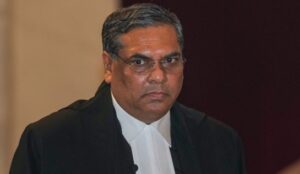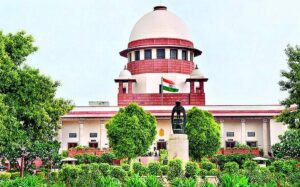
Supreme Court’s Judgment Raises Questions About Presidential Powers on Bill Constitutionality
New Delhi, 15th April 2025: A recent Supreme Court ruling has sparked significant debate over whether the President can be compelled to seek the Court’s opinion under Article 143 of the Constitution regarding the constitutionality of a bill. This question emerged following the Court’s recent judgment on the President’s powers concerning bills passed by state legislatures.
Under Article 201 of the Constitution, there is no explicit time limit or requirement for the President to provide a reason for withholding assent to a bill reserved by governors. However, a bench of Justices J.B. Pardiwala and R. Mahadevan has raised concerns by suggesting that the President should provide detailed reasons for withholding assent or returning a bill to the state legislature, despite the absence of such a mandate in the Constitution.
The Court also appeared to delve into the legislative process, traditionally under the purview of Parliament and state assemblies, when it stated: “A bill that appears to be unconstitutional must be examined by a judicial body. The President is not just precluded, but constitutionally expected to refer the question of the constitutionality of a bill to this court, as the apex judicial body, so that the President can act on it under Article 201.”
This ruling has led to questions regarding the Court’s role in pre-emptively judging the constitutionality of a bill, as there is no provision in constitutional law for an “advance ruling” in such matters, similar to the provisions found in tax laws like GST. The Supreme Court noted that constitutional courts are not prohibited from making suggestions or offering opinions on the constitutional validity of a bill before it becomes law.
In its judgment, the Court advised the President to “seek an opinion on bills that have been reserved for consideration due to perceived unconstitutionality.” The ruling also stated that referring such matters to the Court under Article 143 would alleviate any concerns about bias or bad faith in the central government’s handling of these bills.
However, Article 143 itself does not mention bills or the issue of their constitutionality. Instead, it grants the President the discretion to seek the Court’s opinion on any question of law or fact if it is deemed expedient. The relevant provision reads: “If at any time it appears to the President that a question of law or fact has arisen, or is likely to arise, which makes it expedient to obtain the SC’s opinion, he may refer the question to that court.”
The Court’s judgment also emphasized that, where a bill could potentially undermine democracy, the President’s decision must be guided by the Constitution and the laws, which are ultimately interpreted by the constitutional courts. This suggestion implies that legal experts within the executive may not fully grasp the complexities of constitutional law and may be incapable of providing sound advice regarding the constitutionality of bills.
“The executive’s hands are tied when dealing with purely legal matters in a bill, and only the constitutional courts have the authority to assess and provide recommendations on its constitutionality,” the bench stated, despite acknowledging that the opinion of the Supreme Court under Article 143 is not legally binding on the government.
According to a source from the Ministry of Law, the judgment raises concerns about the practical implications of the ruling. “If every year, each of the 28 states passes five bills reserved for review on constitutional grounds, then under the Court’s logic, the President would need to seek the Supreme Court’s opinion on all 140 bills annually,” the source said.
In 2004, the President sought the Supreme Court’s opinion on the Punjab Termination of Agreements Act, but it took over a decade for the Court to issue its opinion in 2016.
This recent ruling has prompted ongoing discussions about the balance of power between the executive and judiciary, and how best to manage the constitutional process for evaluating the legality of state and central legislative actions.

















